#paddy kingsland
Text
Paddy Kingsland - Horror Chords (B)
Plays in:
43b. "The Bully"
86a. "Roller Cowards"
133a. "The Curse of Bikini Bottom"
#spongebob#spongebob squarepants#music#audio#apm track#The Bully#Roller Cowards#The Curse of Bikini Bottom#Horror Chords (B)#Paddy Kingsland
3 notes
·
View notes
Text
Electronic Sound magazine celebrates 60 years of Doctor Who with the help of The Radiophonic Workshop
Electronic Sound magazine is celebrating 60 years of Doctor Who with the help of The Radiophonic Workshop in their new issue
Electronic Sound magazine is celebrating 60 years of Doctor Who with the help of The Radiophonic Workshop in their new issue (Number 106, November 2023). A silver vinyl Radiophonic seven-inch also accompanies the magazine as well, the material including two Dalek tracks taken from the first story to feature the pepperpot perils.
The cover story, “The Sound of Doctor Who“, boasts an amazing cast…

View On WordPress
#Brian Hodgson#Delia Derbyshire#Dick Mills#Doctor Who#downthetubes News#Electronic Sound#Mark Ayres#Paddy Kingsland#Radiophonic Workshop#Roger Limb
2 notes
·
View notes
Text

BBC Radiophonic Workshop - Tamariu (BBC Records)
arr. Paddy Kingsland, 1973.
3 notes
·
View notes
Text
Here's How Peter Howell Remixed the Doctor Who Theme Tune in the 1980s
Here's How Peter Howell Remixed the #DoctorWho Theme Tune in the 1980s
Fans of the Doctor Who theme (and who isn’t, eh?) should check out this BBC report from 1982 in which Peter Howell describes how he went about revamping the programme’s famous opening tune.
The clip was originally screened on 2nd February 1982 as part of The Music Arcade: Electricity in Music. Peter gives a detailed run through of his use of polyphonic analogue synthesisers, a vocoder, and an…

View On WordPress
#BBC Archive#BBC Radiophonic Workshop#Delia Derbyshire#Doctor Who theme#Dominic Glynn#John Nathan-Turner#Jon Pertwee#Paddy Kingsland#Peter Howell#Ron Grainer#The Leisure Hive
5 notes
·
View notes
Text
youtube
I need to learn music theory so I can figure out why some of these chords in here make me feel physically lighter
0 notes
Text
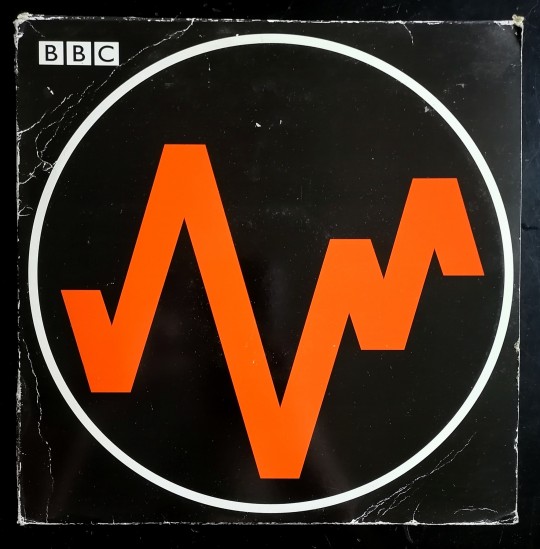
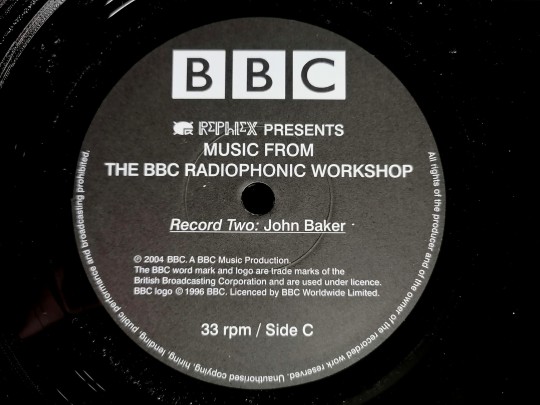
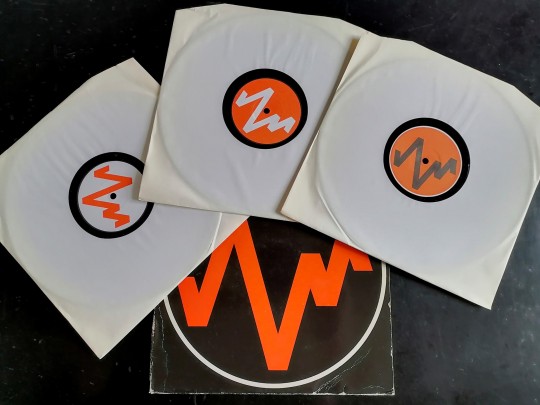
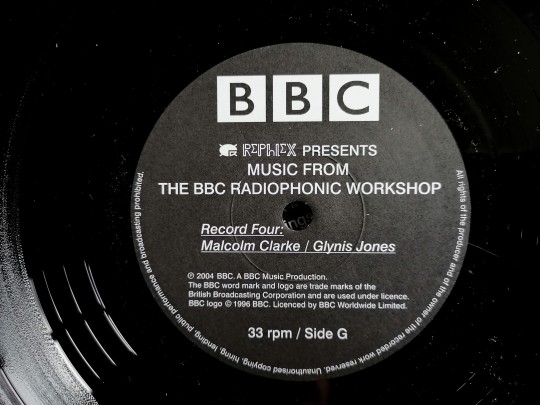
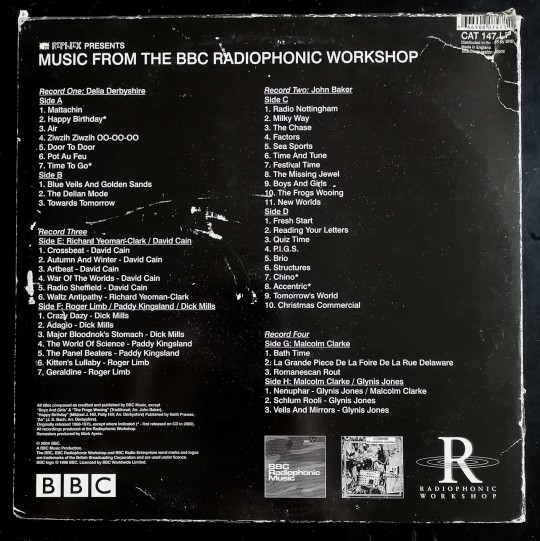
V/A
"Music from the BBC radiophonic Workshop"
(4x10". Reflex / BBC Music. 2003 / rec. 1968-75) [GB]
youtube
#compilation#1968#bbc#radio#library#contemporary#electronic#electroacoustic#concrete#delia derbyshire#david cain#dick mills#richard yeoman clark#paddy kingsland#roger limb#john baker#malcolm clarke#glynis jones#10“s#records#Youtube
1 note
·
View note
Text
youtube
Thanks to @AngeliqueSings for suggesting that my original plan for the "Never Tell Me The Rules" track (the 5th Doctor's regeneration in Caves) would probably work best for Logopolis. As this is more of a heroic track, I felt it worked best for the lead-up to the regeneration rather than the regeneration itself.
So I re-worked it slightly to sound more like a Paddy Kingsland piece of music (the composer of Logopolis) rather than one by Roger Limb (the composer of Caves of Androzani) and applied it to the scene of the Fourth Doctor unplugging the cable on the Pharos Project's satellite to disrupt the Master's plan of universal domination.
I had trouble isolating the dialogue in a way that wasn't jarring. My first attempt produced *just* the dialogue with no sound effects and it sounded awful. Then I realised that Audacity (the software I'm using for this) lumped in the sound effects (the movement of the dish and the Doctor whacking the cable with a wrench) with the percussion instruments, so I combined them.
This is why you'll hear the cymbal sound for dramatic moments like the Doctor letting go of the satellite beam - which I think works anyway - even if it's cut off at the end slightly. The music alone doesn't include that dramatic moment but the inclusion of a cymbal clash works well to evoke the nostalgia of the original music, and the dramatic effect of that moment. However, it cut out some of the sound of the satellite dish moving which is noticeable in the scenes with the Doctor trying to disconnect the cable. I did try to add the sound of an actual dish moving from a YouTube video I found, and isolated the sound from the voices - but it didn't quite work because that video was shot from a distance and had the sound of birds in the background which made it sound too positive for such a tense scene.
I also tried to make the ending less sudden by having a freeze frame of the Doctor's companion's expressions at the end - but it was almost comical in a 70s soap opera kind of way. As literally the next frame is back to the Master, I didn't want to end with that. So it ends with the companions look of horror, even if it is abrupt. Then I realised that this video leads nicely into my previous regeneration music for the Fourth Doctor - although the scenes overlap somewhat.
For that video, I used the Vale Decem score and titled it "Vale Quattuor".
I tried to upload them together but the Copyright gods wouldn't allow it. They don't seem to like any copyrighted material longer than about 4.5 minutes (hence my obscuring of the scene for the recent War Games video which was over 6 minutes). Which is a pity as I had a grand idea of stitching this with both that video and my Season 19 trailer to produce a 'deluxe' alternative end to Logopolis.
I may re-work that trailer video anyway now that I have vocal isolation software, which I didn't have available when I pieced together that trailer. Anyway, I think the sudden ending leads nicely into the regeneration video. and that video is linked on the end screen to go straight into it if you wish - this is a bit of an Easter egg as this is a special version of the regeneration that takes place straight after the events in this video, with a new stereo mix of Vale Quattuor, and includes the S19 trailer I made last year. It’s ONLY viewable via the end of this video (at least for now).
As usual, I tinkered with the thumbnail *after* I uploaded the video. I utilised a screenshot of the clean Logopolis credits provided by @THEtimelessnerd for the YouTube thumbnail, but the old version is on the video itself. If anyone notices that kind of thing! I'll still work on something for the Fifth Doctor's regeneration, and the 1st and 3rd regeneration's for that matter, for future projects.
MIDI by chilybones222 Subtitles courtesy of chakoteya.net
#doctor who#dr who#dr who fandom#dr who meme#classic who#fourth doctor#4th doctor#11th doctor#eleventh doctor#Youtube
4 notes
·
View notes
Text
Now here’s something I’m trying to get to the bottom of...

Y’know space funeral, right? It’s this great game you see on Twitch and Youtube a lot, and it’s got all this great music!
Most notably, you got tracks like One-Eighty-One and Colour Radio straight from this one album by Paddy Kingsland:

https://en.wikipedia.org/wiki/Fourth_Dimension_(Radiophonic_album)
And I can’t figure out why Space Funeral is allowed on Twitch/Youtube, even though it has all this copyrighted music..? Fourth Dimension doesn’t seem to be in the public domain or anything; so what gives?
I could probably sit on my ass and think of all sorts of unsatisfying reasons (like maybe this album is too obscure/commercial to attract the fun police), but if anyone has any good leads, I’d be grateful!
#space funeral#twitch.tv#twitch#youtube#taggitytagtag#copyright#video games#I'd love to fill my own RPGMaker game with old commercial tracks#but I wanna know if my friends will get thrown in copyright jail if they stream it :(
9 notes
·
View notes
Text
Music Review: The Changes

Is there a more iconic early '70s British telefantasy soundtrack than this? When you have Paddy Kingsland, the BBC Radiophonic Workshop, and a small ensemble of acoustic instruments wrapped around Kingsland's catchy melodies, you have an entire album of earworm scoring. theLogBook's Music Reviews roll with The Changes: https://thelogbook.media/music/the-changes-soundtrack/
Read the full article
0 notes
Photo

BBC Radiophonic Workshop, Fourth Dimension (BBC Records, 1973).
71 notes
·
View notes
Text
Paddy Kingsland - Magical Effect
Plays in:
42b. "My Pretty Seahorse"
70b. "Ghost Host"
#spongebob#spongebob squarepants#music#audio#apm track#My Pretty Seahorse#Ghost Host#Magical Effect#Paddy Kingsland
6 notes
·
View notes
Photo

Penda’s Fen by David Rudkin — A Davis-Poynter TV Script of a BBC Pebble Mill Production (excerpts)
Young Stephen, in the last summer of his boyhood, has somehow awakened a buried force in the landscape around him. It is trying to communicate some warning, a peril he is in; some secret knowledge; some choice he must make, some mission for which he is marked down.
First published in 1975 by Davis Poynter Limited.
Copyright © 1973 by David Rudkin.
All rights whatsoever in this play are strictly reserved and application for performance or reading should be made before rehearsal to Margaret Ramsay Limited, 14a Goodwin’s Court, St. Martins Lane, London WC2, England. No performance may he given unless a licence has been obtained.
ISBN 0 7067 0187 9
Printed in Great Britain by Biddies Limited Guildford Surrey.
AUTHOR’S NOTE
This represents the finalized shooting-script from which PENDA’S FEN was made. I say ‘represents’ because my very elaborate technical instructions (for camerawork, lighting, soundtrack, etc.) I have removed; instead, I have sought to convey the resultant effects expressively to the reader’s inner eye and ear.
I cannot pay tribute enough to the unsparing self-commitment or the crew and actors to what proved an exhausting and at times quite frightening task: the film itself is their best testament. But I must, without being invidious, single out for particular gratitude the producer, David Rose, who, far from being daunted by my first synopsis, virtually insisted PENDA into existence, and quietly removed every administrative and financial barrier that might have fallen in it’s way. I must try to thank also the director, Alan Clarke, for his deep stillness and moral integrity in its realization - a director gifted with that rarest and most significant director’s gift of all, the gift of standing out of his own light.
D R
STEPHEN Spencer Banks, MRS FRANKLIN Georgine Anderson, THE REVEREND J FRANKLIN John Atkinson, JOEL Ron Smerczak, HEADMASTER John Richmond, ARNE Ian Hogg, MRS ARNE Jennie Heslewood, SIR NICHOLAS POLE John Scott, BROTT Roy Preston, HARRY Ian Gemmell, MRS GISBOURNE Joyce Grundy, COOKE Ivor Roberts, SIXTH FORMER Moray Black, HONEYBONE Christopher Douglas, COUNCIL WORKMAN Frank Veasey, NURSE Elizabeth Reville, JOEL’S GIRL Pat Bowker, SIR EDWARD Graham Leaman, MRS KINGS Helena McCarthy, THE LADY Joan Scott, THE MAN Ray Gatenby, KING PENDA Geoffrey Staines, DEMON Geoffrey Pennells & ANGEL Martin Reynolds.
Film Camerman: Michael Williams, Operator: Ken Morgan, Sound Recordist: John Gilbert, Sound Mixer: David Baumber, Film Editor: Henry Fowler, Costume: Joyce Hawkins, Make Up: Jan Nethercott, Special Effects: Clifford Gulley, Animation: Bernard Lodge, Radiophonic Sound: Paddy Kingsland, Design: Michael Edwards, Script Editor: Tara Prem, Producer: David Rose, Director: Alan Clarke.
First transmitted on Thursday, 21st March 1974 (as ‘Play for Today’) by BBC Television.
A loud crunching chord: strings break out, an ambling soaring open-country tune*. High summer. As though liberated, by his little victory, from the spell of COOKE, STEPHEN now, in shirt and jeans, pedals his old bicycle through the coloured landscapes of the Elgar country. The purple wrinkled hills of Malvern are now somewhat nearer, larger, more physically present than before. Slowly, slowly, as he pedals, handfree, whistling the glorious tune itself, the hills seem to turn towards him as, picture by picture, he crosses the landscape.
Now the music breaks up into rapid movement, gathering in excitement towards a climax. STEPHEN’s shadow races along the surface of the lane. He freewheels down a steep tree-lined bank; hurtles wildly round a corner in a village, scuffing the dry road with his feet for a brake. The high hedges, flowered banks, arching treetops, streak past him in lines. The blind-hedged twisting and curving lane leaps towards the jumping racing handlebars. At the peak of the music, the violins leap up to a piercing high note like a shriek of lightning; up from the lane-surface, like an ascending diver from the floor of a pool, swoops the DEMON of STEPHEN’s dream, his eyes, jaw, smile and mouth - The music vanishes; STEPHEN falls; his bicycle clatters riderless to the ground against a steep ditch; STEPHEN rolls onto the grass bank-edge, still, stunned. The bicycle lies, its wheel spinning: we hear its whirr and click. STEPHEN lies, unconscious.
* Again, from Elgar 'Introduction and Allegro’: the reprise of the main 'second subject’ theme, towards the principal climax of the piece.
Unnatural silence. Unnatural stillness. The light and colours are dry, a little too bright to be real. The bicycle: but it lies in a different posture and position; and not by the steep grass bank, but before a wooden five-bar gate - and on the surface of a road, its rear wheel still, silent. Far from it, and in the 'wrong’ direction - where he could not possibly have landed - lies STEPHEN, stunned, unconscious: again, not by the bank, but on flat grass shoulder of a level road. A soft muttering: voice of JOFFER indistinctly grumbling to himself. STEPHEN is awake. He is raising his head. We are at the junction with the Pinvin road across the fen. There seems to be nothing surprising to STEPHEN in this.
Now he sees where the grumbling sound is coming from: the trestles, diversion board blocking the road. JOFFER, his back to us, is with dark deliberate action peeling away the pasted V from PINVIN. STEPHEN glances back over his left shoulder to the signpost. On signpost, no sack: its black letters spell PINFIN. STEPHEN looks toward diversion board again. JOFFER is moving away; board reads PINFIN, just as he had painted it. STEPHEN looks up toward signpost again. Is puzzled by what he sees. Signpost’s white is unnaturally luminously bright. Black letters spell (plain English script) PENDEFEN. STEPHEN has turned toward road again. Trestles, diversion board have gone. Road leads away, unbarred, onto fen landscape, across which strange light-and-shadow plays.
Now STEPHEN stands. And suddenly we are that unseen presence again, rising behind him, taller than he; following him onto the open fen. Then we see STEPHEN coming forward, as drawn. His breathing becomes sexually deep, we hear it. Then a new sound: a muted chopping. It is coming from behind him. He turns.
Before him now, stone terraced steps lead up between ornamental lawns towards the black-and-white facade of a half-timbered manor house. STEPHEN is going up the steps. The house itself is like an extended version of the smaller half-timbered house before which JOEL’s milkfloat killed the sparrow. STEPHEN finds himself in a wonderland of billiard-table lawns, topiary bushes and dark-green hedges of yew that seem cut velvet-smooth. Everywhere, lyrical gardenbird-song. The chopping sound seems to come from beyond one of these hedges.
STEPHEN comes round the hedge. A party of people, fine and healthy, as near to Eden innocence as is consonant with setting, children with them, are grouped in various relaxed poses upon the ancestral lawn, waiting their turn, happy, noisy-looking (yet no human sound), eyes bright as on brink of some redemption. STEPHEN looks where their fond expectant gazes are.
In middle of lawn, a large tree stump, sawn table-flat. An impeccably dressed man in middle age, in build and sartorial immaculacy rather like Hitchcock, is waiting for the next person to come to the stump. The stump drips with blood. He has a butcher’s axe. No blood has spattered the AXEMAN at all. A MOTHER with a LITTLE GIRL come to him. AXEMAN gestures, with courtesy, a gentle little patient smile, 'Little girl first, please’. LITTLE GIRL obediently places hands on stump. MOTHER looks at her, proud, privileged. AXEMAN wields axe.
STEPHEN watches. He shows no emotion. Chop. Chop. Muted sound of little girl laughing. He watches, expressionless, the figure of the LITTLE GIRL run gaily off in her party frock, waving her stumps.
AXEMAN takes little severed hands, throws them down behind stump. He has a methodical unhurried address to his task: to him it is a sort of necessary social editing. MOTHER lays her own hands on stump, panting in anticipation.
STEPHEN stands paralyzed against the hedge. Emerging from the group, coming towards him, are the MAN and LADY of the newspaper-photograph he showed us during his speech at the school debate: the 'father and mother of England’, who had succeeded in having the television 'Jesus’ programme banned. They are coming for STEPHEN, their faces transfigured, their arms raised as in that photo, reaching in welcome to bring him to the stump. - STEPHEN is shaking his head, his lips trying to fashion the words No No! But no sound comes, and he cannot move.
Then the real, Worcestershire voice of JOEL is speaking:
JOEL (VOICE): You all right, squire? You all right?
(His features unclear in a blinding dazzle of sunlight, JOEL is looking anxiously down at us, his face questioning.
STEPHEN is coming to. JOEL’s face is clearer now. We see that STEPHEN lies where he originally fell: by the steep grass bank. Now STEPHEN sees this. Nearby, rear wheel of bicycle still spins: wheel whirr. He sees, too, JOEL’s milkfloat: it has braked sharply, skidding at an angle in mid-road. JOEL puts arms round STEPHEN’s shoulder to help him up:)
JOEL: Come chargin’ down that hill right into me.
(It suddenly dawns on STEPHEN whose arm this is. The old tension, guilt-panic awakens in him; he pulls to be desperately free. JOEL misunderstands, grips more tightly, personally:)
JOEL: Hey . . Hey . .
(He will not let STEPHEN go. STEPHEN becomes aware of his own hands touching JOEL’s shoulder or arms. He leaves them there, using them to brace him as they stand. He commits himself to the contact, drawing his hands down a little, frankly toward his waist. JOEL now understands what STEPHEN’s attitude is, has always been. It all makes sense. Hard, but not brutal, and not over-compassionate either, he removes STEPHEN’s hands; yet does not thrust them from him.)
JOEL: Sorry. Just help you up, that’s all.
(He looks STEPHEN straight in eye. STEPHEN, after hesitation, finds honesty in himself to do the same. It is not easy. It is done.)
JOEL: (Quite hard.) That’s all.
(Their hands separate: a frank withdrawal.
A GIRL sits in passenger seat in float. Now she calls out:)
JOEL’S GIRL: Joel?
JOEL: (To her) He’m all right, dove. We 'a'n’t killed him.
STEPHEN: (Rather strenuously, to her.) I’m all right:
JOEL: He’ll get over it.
(He looks at STEPHEN: a mere brutal acceptance; no yielding. He goes back to float. STEPHEN watches. Engine sound. Float straightens, passes him. JOEL makes a quite objective formal gesture at him. STEPHEN waves back, his gesture incomplete. He feels a new acceptedness.)
Inside the church. It is plain, neither rich nor pretty. Sun-light through high windows. The West Door heavily of)cos towards us. STEPHEN conies quietly in; in shirt, jews. lie quietly shuts door behind him. He comes along aisle. He has a book with him. We hear his footfalls, the occasional creak here or there of beam or pew. He goes to the organ. He stands there before it a moment. He switches on the organ i light; and we see there, also, an organist’s mirror - into which the player can glance while playing, to see what is happening in the service behind him in the church. Now STEPHEN swings his legs over the organist’s bench, careful not to depress the long pedal-arms beneath. He switches the organ on: a deep, faint, almost inaudible droning hum. He rests the book before him on the music-rest. He has the look of someone about to try a long-pondered spell. He opens the book, presses the first two or three turned leaves flat against the music-rest, to lie there still and not to close again.
Before us now, the heading on the recto page: THE DREAM OF GERONTIUS, Edward Elgar. It is the 'vocal’ score, with the orchestral parts arranged for keyboard. Above first staves of music the word 'Prelude’. Above first bars, pencilled capitals: 'Motif of Judgment’. The first few bars themselves have single minims and crotchets spaced along the lower stave, bound beneath one long curving slur.
STEPHEN considers these. He is working out in his head what colouring this opening music needs. He pulls a stop, another. Then slowly he begins to play. It is a solemn and lonely-sounding phrase, this 'motif of Judgment’: deep-hued, veiled and plaintive tones that fall from a note, fall from it again, slowly rise up to it, then a step, another step above; then rest back onto that note again where they began. STEPHEN plays on; the music begins to arouse itself - but after two notes, he pauses; stops. Somewhere in the church, a creak. And always, that deep faint organ hum. Out of habit he glances into the mirror, but of course the church is empty.
We see what STEPHEN does not see. We look along the flat gravestones of the aisle, between the towering pew ends, toward the West Door.
STEPHEN turns the page, looking for the next passage he wants to play. He finds it. Large wide-spaced chords to be sustained, with shorter crotchet-phrases to he interjected during then: above these, the pencilled words 'His Cry’. Already STEPHEN is playing: the chords high, solemn and pleading, over their deep roots in the bass, and an off-beat heavy treading, figure stark within them. They soon roach a climax, and collapse in syncopated fragments downwards, into silence*.
Organ hum. Along the aisle toward the West Door, the light is darkening.
STEPHEN continues, In the score, the pleading chords of the 'Cry’ are now repeated, but in a higher key, giving them more urgency. And, as his hands take the chords and treading-figure, and his feet on the pedals the deep roots in the bass, out of the organ suddenly conies a grand and powerful glorious tone: the boy’s music resoundingly transfigured, to move us to tears and chill our spine. And STEPHEN too is moved. Again the climax, the disintegrating collapse, the echoing silence. But for the organ hum. In the aisle threatening to run the length of it to the far West Door, the beginning of a jagged veinlike crack has appeared.
STEPHEN pauses. He turns several pages, many. Then, far into the book, finds page lie seeks. Pencilled capitals 'Angel’s Triumph’. Words, notes of vocal line: ’ . . soul! For it is safe, consumed yet quickened by the Glance of God!’ We hear from afar, as STEPHEN, smiling in recognition, hears in his head: the soaring and swooping Angel-song with which the play began. She comes to her great Alleluia, and our eyes are drawn in along the notes themselves, and in, in, in towards the printed symbol of the crowned towering top A itself. But here the voice and music fade, Organ hum. The crack along the aisle has visibly widened; it 'runs’ before our eyes to the far West Door, and veinlike 'tributaries’ appear.
Now STEPHEN, unaware of the unnatural darkening in the church around him, prepares to play the crescendo passage that builds toward the climax of the work. His foot takes a low A on the pedal, holds it down; the deep root- sound sustains. Quietly, his hands take the first chords: often clashing with that unchanging bass, these upper harmonies sound unnerving, intense. We hear in them a harsh evolution from that quiet. lonely phrase, the Motif of Judgment, with which STEPHEN began.’ And as, louder and tauter, STEPHEN plays now, this evolution continues: the phrases mount and grow; the key changes, the deep pedalpoint falls; the chords pile up, massive and anguished; the key and pedalnote shift again. In the mirror is total blackness; the fissure in the aisle has widened to a chasm; STEPHEN has come to the music’s peak.
The moment of terrible silence. His hands rise, fingers stretch, forming to take the keys that will make up the 'fearful dissonance’. The aisle yawns, a torn-edged black engulfing void . . With all the power he can produce from the instrument, he sounds the dissonance. But it is not enough. It is not enough. Suddenly STEPHEN has broken through even this: with hands and feet he adds every other note to the dissonance that he can reach. And holds them down. A piercing discord of unbelievable obscenity.
STEPHEN suddenly sees hellish inky blackness in organ-mirror. His hands quit keyboard in horror. The dissonance vanishes; only the lowest pedalnote remains, a deep C sharp, keeping all its clashing overtones alive in our heads, while through the actual silence a Voice speaks:
VOICE: Stephen … … …
VOICE: (STEPHEN bows head, he dare not turn.)
VOICE: Stephen Franklin
(STEPHEN slowly raises eyes to organ-mirror. Inky darkness there. Dimlit, like detail from Grünwald Crucifixion, the leprous Feet pierced with one ugly cruel nail. The Living Blood drips down.)
VOICE: Unbury me … . Free me from this tree … .
(STEPHEN transfixed. Suddenly pedal C sharp cuts off. Silence. The moment has passed. The aisle is as it was. The church is normal, the sunlight as before. There STEPHEN sits, on the organ-bench, his head bowed from us, arms loosely hanging, self and body drained.)
*This passage is found at rehearsal figure 9 in the score.
FINALE
The Malvern Hills themselves. Their slopes, ridges, lonely, primordial, in summer sunset from the further West. Soft thud and shock of evening wind.
A high ridge-top. Here STEPHEN sits, stone-still, gazing toward setting sun. It is as though he has been summoned here. He waits. His dark motionless form there, seated on the ridge-top, against the sunset sky.
Two forms slowly slowly ascend into view up the Western slope before him. The MAN and LADY. They walk, yet seem not to rise on the balls of their feet. Now they stand before him on the ridge-top, tall against the Western sky, the MAN to one side of him, LADY to he other.
LADY: (Shy, needful) Are you an English boy?
MAN: (Gentle, on brink of ecstasy.) Such a light in his eyes.
LADY: True English boy?
MAN: It is He. It is He. He has the Light.
(STEPHEN, as though under some influence, dumbly can merely look from one to other, daring hardly raise his eyes. MAN, LADY we now see some-what more clearly: the 'father and mother of us all’ of Stephen’s newspaper photo. They are transfigured with deep still irradiating joy.)
LADY: We knew the Child would come. He has been promised us so long. But that we should find him! It is too lovely to be true!
(MAN reaches out a loving hand to STEPHEN - )
LADY: (Tabu horror) No If we touch Him, He will vanish! (Turns to STEPHEN) It is written.
(STEPHEN terrified: every urge in him resists, compels to flight. He cannot move. He gazes up at MAN, LADY, animal-like in his dumb helplessness.)
MAN: The Child is innocent. He does not know His inheritance. Nor does He know the courage He will need, to exercise His Right in this dark world. Not that they put us to the fire any more. Oh Stephen, Stephen: think of that torment …
(MAN leans close to STEPHEN, consumed with a desperate love: he is like a sonless father, begging his unborn son who refuses to be born, 'Be born!’)
MAN: … to be burned. Shackled to the mockery of a tree, and burned. Living, burned away … .
LADY: What torment is that? Through the flames we see Our Lord. He reaches out His Hand to bring us from the shadow of this world. We that were burned, we cried in joy. The Crosstians think we scream: we cry in joy! When we are burned, why, we are turned to Light!
(STEPHEN slowly shaking his head, trying to say No, to move. He cannot. MAN kneels before him, pointing west.) Look. Your Inheritance.
MAN: Look. Your inheritance.
(STEPHEN tries to dredge up the words of denial from within himself: he can only writhe his neck and head.)
MAN: The Kings of the earth, you can govern.
MAN: (Cont) They walk in their sleep. Yours is the Right, to inherit the Power: to will their will.
(LADY kneels close to STEPHEN, who now can merely writhe his head between them.)
MAN: Power, Stephen, to turn the rock of the world to wealth. Power: to fall, and not to die. Like Joan the Maid, to fall, and not to die.
(STEPHEN pauses: this rings some bell in him. It is beginning to steal through him in what mortal danger his soul now is. He still struggles to tear a sound or gesture of denial from himself. He can-not. MAN, LADY become more and more consumed with a desperation to bring him away with them: a passion with no erotic, but a terrifying parental-loving, element.)
LADY: You have to come with us. You are our Child of Light. You have to be born ill us. Then you become Pure Light.
(STEPHEN suddenly finds denial:)
STEPHEN: No! No! I am nothing pure!
(LADY cries out: refusal would he than she could bear, In a moment the will be weeping - )
STEPHEN: Nothing pure … My race is mixed, my sex is mixed, I am woman and man, and light with darkness, mixed, mixed! I am nothing special, nothing pure. I am mud and flame!
(“Εγνωκεν αύτόν he has 'discovered himself’. No more now, can myth of being pure anything afflict him or cause him to afflict mankind. It is moment of his rupture, salvation from his false 'father and mother of us all’. And he finds the feet to stand, break from them, run away - )
LADY: (Desperate, afraid) If we cannot have him darkness must not. (Suddenly vicious) Run if you like!
(STEPHEN’S terrible organ-dissonance breaks shatteringly out; STEPHEN is running down the Eastern slope. LADY leaps to her feet, bringing up an instant-develop camera in her hand. She snaps fleeing figure of STEPHEN, one, two times, three. STEPHEN runs stumbling down the slope away from them, not daring look back. LADY rips instant-develop print of STEPHEN out from back of camera. She, MAN are racked with weeping now: knowing they must destroy their Angel rather than let him go to their Enemy. This knowledge breaks their hearts. Their viciousness, sick cruelty, evil shake with gleaming jewel-like tears as MAN brings cigarette-lighter to a lower corner of print; flicks flame; flame takes. The fearful dissonance grinds on. From STEPHEN’s stumbling legs on the hillside smoke appears, threatening to burst into flame. The print of him in the LADY’S hand begins to blister. STEPHEN falls, writhing in the thickening smoke that comes from his own body now: he cries out, the sound lost in the dissonance, 'Help me! Help me!’ The flame eats across the print, to STEPHEN’s left side. STEPHEN himself, his left leg, arm, left side of head scorching, screams in pain. And suddenly, through the dissonance, we can see that his mouth is forming a cry to 'Penda . . ! Penda . . !’
A flash, a double scream: the MAN and LADY vanish in an explosion of flame; and in that same incandescence, amid their falling severed burning limbs, the ancient throned form of PENDA himself appears. And there is silence.)
KING PENDA: There you have seen your true dark enemies of England. Sick Father and Mother, who would have us children for ever.
(STEPHEN frowns, puzzled. He is totally unharmed, his clothes and body whole as before.)
STEPHEN: King Penda . . ?
KING PENDA: Stephen. Our land must live. This land we love must live. Her deep dark flame must never die.
(STEPHEN is nearer.)
KING PENDA: Night is falling. Your land and mine goes down into a darkness now; and I, and all the other guardians of her flame, are driven from our homes, up out into the wolf’s jaw. But the flame still flickers in the fen. You are marked down to cherish that. Cherish the flame, till we can safely wake again.
(STEPHEN raises head to ask a question. STEHEN stands: alone, on all the hill. And now he looks back, across the land in shadow: that outer landscape of the earth, and inner landscape of the head, across which this, his journey has been made. It is the very physical reverse to that image of England with which we began: for now we look eastwards, from those hills themselves, And night is coming. No soft choir music on the soundtrack now, but the actual sounds of evening on the earth: a lapwing, a distant train, the pulse of a factory below. Onto that landscape now STEPHEN is walking slowly thoughtfully away from us down. He is fortunate. Early, and at the right time, he has been vouchsafed a meaning for that old question he once glibly asked himself: what is to happen to his soul? Which shall prevail? The Angel, or the Pandemonium; the sickness of power and obedience to power, or the sacred demon of ungovernableness.)
#Penda's Fen#David Rudkin#Alan Clarke#1974#BBC#David Rose#Play for Today#Spencer Banks#Michael Williams#Henry Fowler#Pinvin#King Penda#Edward Elgar#Paddy Kingsland#BBC Radiophonic Workshop
8 notes
·
View notes
Audio

David Snell - Killing Me Softly With His Song (BBC Records)
1974
#David Snell#Killing Me Softly With His Song#roberta flack#jazz harp#harp#hits#bbc records#1974#paddy kingsland#easy llistening
12 notes
·
View notes
Text
Celebrating the 60th Anniversary: Doctor Who @ 60 - A Musical Celebration Concert
Celebrating the 60th Anniversary: #DoctorWho @ 60 - A Musical Celebration Concert
Music from across six decades will be celebrated as part of Doctor Who‘s 60th anniversary later this year, with a special concert in Wales, to be broadcast on BBC Radio 2.
Doctor Who @ 60: A Musical Celebration will feature music by Dudley Simpson, Paddy Kingsland, Murray Gold, and Segun Akinola — not to mention Ron Grainer’s Doctor Who theme as originally brought to life by Delia Derbyshire (as…
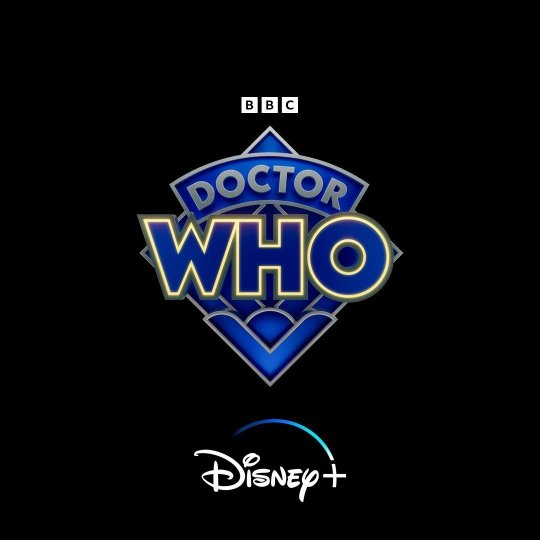
View On WordPress
#60th Anniversary#BBC Radio 2#Delia Derbyshire#Doctor Who @ 60: A Musical Celebration#Dudley Simpson#Fifteenth Doctor#Murray Gold#Ncuti Gatwa#Paddy Kingsland#Ron Grainer#Segun Akinola
1 note
·
View note
Text
On This Day (January 30)…Happy Birthday, Paddy Kingsland!
On This Day (January 30)…Happy Birthday, Paddy Kingsland!
The composer Paddy Kingsland was born on this day in 1947.
Kingsland at work. Retrieved from here.
Kingsland is famous for his work at the BBC Radiophonic Workshop, a group of technologically-inclined composers who provided BBC’s TV and radio productions with sound effects. Known as “the British Kraftwerk”, this group was particularly noted for their work on one of the most well-known and…

View On WordPress
#1947#BAFTA-nominated composers#BBC Radiophonic Workshop#Composers#English Composers#Happy Birthday!#January 30#Movie Composers#Music History#On this Day#Paddy Kingsland#TV Composers
1 note
·
View note